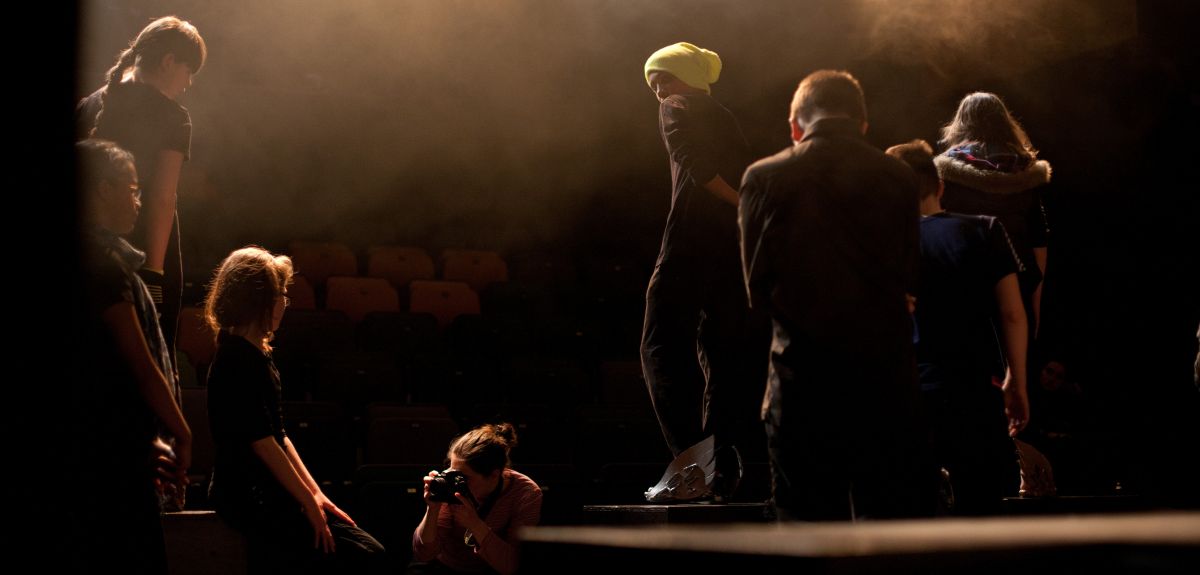
Image credit: David Fisher.
'Art activities help children disaffected with school'
New research conducted by Oxford University says arts-based interventions, designed for young people who are disaffected with school, can be very effective.
Researchers from the University's Department of Education observed a range of programmes and carried out interviews with staff and the young people who attended them. Their report concludes that the out-of-school interventions that gave young people the opportunity to try activities, such as acting or photography, gave them ‘space’ to discard their old identity and find a new one. This could have a 'profound' effect on how they see themselves and others around them, the study reports.
Lead researcher Professor Harry Daniels, from the University's Department of Education, said: 'There has been much anecdotal evidence about the benefits of arts programmes for disaffected young people and our research backs this up. Through working with adult professional artists and young leaders, young people receive some of the emotional tools they need to interact with the world, which can transform the way they see themselves and others around them.'
The research team from the University's Department of Education attended sessions organised by Pegasus Theatre in Oxford and OYAP Trust, based in Bicester, over six months in 2014-2015. Interviews conducted with the young people showed that such arts-based interventions could free them from their fear of failure or what they saw as the constraints in their life. Some of the young people also reported improved attendance at school and a better attitude in class.
Through working with adult professional artists and young leaders, young people receive some of the emotional tools they need to interact with the world, which can transform the way they see themselves and others around them.
Professor Harry Daniels
At Pegasus Theatre, researchers went to an ongoing one-hour weekly theatre and dance group for vulnerable young women, weekly 90-minute drama and script-writing sessions for a mixed group, and courses of eight to ten drama sessions for Year 7 pupils who had been selected by their school because of their behaviour or poor attendance. Those attending the programmes said they were a 'safe space' where they could be themselves, and where staff members were 'caring' and 'non-judgmental'.
One young participant said: 'When you’re in school they are more full-on, and when we come to a group outside and it's like you’re still learning, but it’s more fun. Like they’re more relaxed and you feel like you can interpret more and you don’t feel so pressured.'
The OYAP Trust projects that the researchers attended were a weekly, five-hour flexi-school programme for young people who had refused to go to school or had high levels of exclusion and disengagement, as well as a programme offering support to young people who were leading positive social change in their communities through the arts. The researchers also attended workshops for song-writing, music recording and photography.
The young people worked towards Arts Awards, accredited by Trinity College London in association with Arts Council England, which the study says provided 'opportunities for celebration and praise'. One of those interviewed said about film-making: 'You can express, kind of like how you feel, and try out new things that you’ve thought'; another said of poetry-writing, 'it’s just something to take my mind off and keep my imagination going'.
Pegasus Theatre's Chief Executive Jonathan Lloyd said: 'This research has been invaluable. It has helped us reflect on our own practice and makes a compelling case for the impact of the work we do with disadvantaged young people. Thanks to our funders we are able to offer a level of depth, care and support to young people over a sustained period of time. Oxford University’s Department of Education’s research has provided clear evidence for the value of working in this way.'
Director of OYAP Trust, Helen Le Brocq, said: 'The research was important for OYAP Trust as it gave us the chance to examine our approaches to inspiring young people through irresistible opportunities to engage with artists, and to developing creative adventures designed by young people themselves. Disengaged young people need encouragement to experiment and be fascinated by things. This research has enabled us to unpack our instincts and be confident in our practices.'
Professor Daniels added: 'This research does not suggest that mainstream arts activities would have the same results. The programmes studied were designed specifically for particular groups of young people and featured elements that directly tackled some of their problems. There were sometimes issues with how often the young people could attend due to clashes with school timetabling or family commitments and these tensions do need to be addressed.'
The research was supported with investment from Artswork, the South East Bridge.
 Nearly 500,000 children could die from AIDS-related causes by 2030 without stable PEPFAR programmes, Oxford experts estimate
Nearly 500,000 children could die from AIDS-related causes by 2030 without stable PEPFAR programmes, Oxford experts estimate
 Expert Comment: Why has Trump launched so many tariffs and will it cause a recession?
Expert Comment: Why has Trump launched so many tariffs and will it cause a recession?